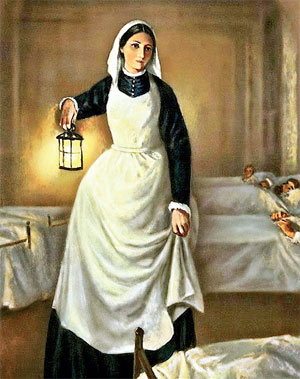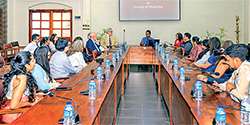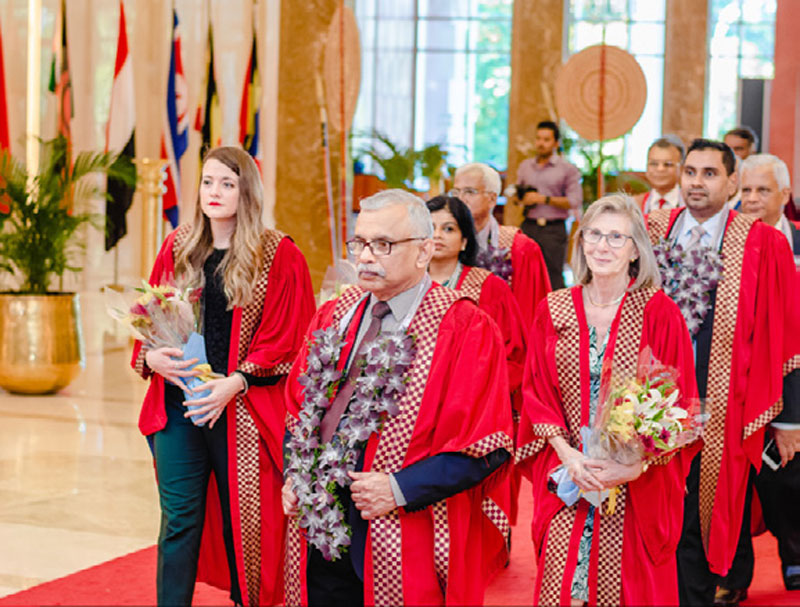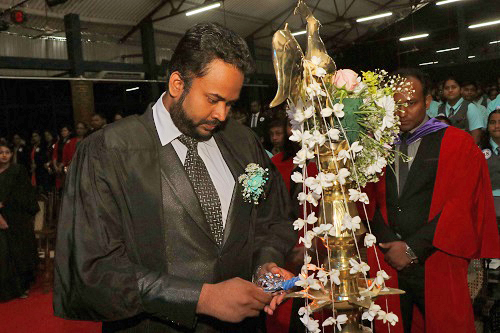The Lady with the Lamp
 It was just another day in November back in 1854 when a woman in her early thirties entered through the doors of the Barrack Hospital in Scutari, leading an officially sanctioned party of 38 women. Outside those doors, Britain, France and Turkey were at war with Russia. Crimean War, it was called as, and the British troop base and hospitals for the care of the sick and injured soldiers were primarily based in Scutari across the Bosporus from Istanbul. But inside those doors, even though it was supposed to be a place for caring and treating the injured, the hospital was seething with filth, decay, disease, death and men in a pitiful state, not much of a difference from the war going on outside, maybe except for the firing guns.
It was just another day in November back in 1854 when a woman in her early thirties entered through the doors of the Barrack Hospital in Scutari, leading an officially sanctioned party of 38 women. Outside those doors, Britain, France and Turkey were at war with Russia. Crimean War, it was called as, and the British troop base and hospitals for the care of the sick and injured soldiers were primarily based in Scutari across the Bosporus from Istanbul. But inside those doors, even though it was supposed to be a place for caring and treating the injured, the hospital was seething with filth, decay, disease, death and men in a pitiful state, not much of a difference from the war going on outside, maybe except for the firing guns.
Wounded soldiers were having limbs sawn off without anesthetic, unscreened from other patients. The most basic medical supplies were not available. British soldiers were dying in large numbers in the hospitals and of cholera than on the battlefield. It was literally like hell on Earth. Even though the hospital badly needed help, the medical officers did not welcome the team of nurses. Back then, nursing was looked on as a disreputable job undertaken by rather dreadful women who drank hard liquor. This woman, who voluntarily came with a team she selected, wanted to change the perspective people had of nurses. She chose emotionally strong women who were prepared to live in the toughest conditions and work with distressing cases and wounds.
This team of 38 women consisted 14 hospital nurses, 14 Anglican sisters, and 10 Roman Catholic nuns. Unwelcomed by the doctors, this team saw that the conditions were filthy, supplies inadequate and it was overcrowding. Rather than arguing with doctors, she decided to put her nurses on standby and expected the doctors to ask for help soon. And they did. Soon things started to improve making a huge change in the death rate. The person who was the sole reason behind this improvement was none other Fl o rence Nightingale. Nightingale had to fight against three squabbling government departments to implement improvements at Scutari. Things improved, albeit too slowly for her. She bought equipment with funds provided by the London Times and enlisted soldiers’ wives to assist with the laundry.
The wards were cleaned and nurses looked in to providing everyone with basic care they need. Most importantly, Nightingale established standards of care, requiring such basic necessities as bathing, clean clothing and dressing, and adequate food. She even paid attention to the psychological needs of the patients where she assisted in writing letters to relatives and provided educational and recreational activities. Nightingale was idolized by the soldiers, who could see she was working herself to exhaustion to care for them and improve their lot. She wandered around the wards at night too, providing support to the patients and eventually she earned the title ‘Lady with the Lamp’.
During her first winter at Scutari, 4,000 soldiers died. Nightingale ensured that no soldier died alone. She was personally there to comfort at about 2,000 deaths. Gradually she made improvements to the bedding and the cleanliness of the hospital and she gained the respect of the soldiers and medical establishment alike. The mortality rate at the hospital at Scutari fell from over 50 percent in Nightingale’s first weeks to 2 percent. She recognised the crucial importance of the Sanitary Commission’s work in bringing down the death rate and she resolved to implement better sanitation wherever she had influence. The government was energized to send a Sanitary Commission to Scutari in March 1855.
This resulted in the repair, cleaning, and ventilation of sewers, installation of ventilation shafts, increased spacing between patients, site drainage, removal of open toilets, installation of a system to flush the drains several times daily, and the walls of wards being washed several times daily with lime. Despite her selfless devotion to the soldiers housed at Scutari, and the legend that grew around her as a nurse, it’s important to remember that Nightingale was not only a nurse. Born on 12th May, 1820 in Florence (Italy), she was the second daughter of Edward and Frances Nightingale who came from respectable wealthy families and led comfortable lives. As a child, Florence was a precocious child intellectually.
Never satisfied with the traditional female skills of home management, she preferred to read the great philosophers and to engage in serious political and social discourse with her father. At the age of 16, she experienced one of several ‘calls from God’ and decided that her ambition was to reduce human suffering and nursing seemed the suitable route to serve both God and humankind. However, despite having cared for sick relatives and tenants on the family estates, her attempts to seek nurse’s training were thwarted by her family as inappropriate for a woman of her stature. But somehow she sought to break free from her family environment because she wanted greater meaning from her life.
In 1849, she exasperated her parents again, this time by rejecting a proposal of marriage from Richard Monckton Miles, a social reformer. To escape the strife at home, friends took her on vacation to Germany. Defying her parents, she lived in a hospital, Kaiserswerth, observing the treatments offered there. There she wrote a 32-page paper recording her observations, which she published anonymously in 1851. In 1853, aged 33, Florence Nightingale escaped. She got a job in London in charge of an institution caring for sick women. Her father had realized how unhappy the restricted life she led at home was making her. He secretly began paying her an allowance of £500 a year – enough for her to be comfortable and independent.
In her first post in London, she completely transformed the hospital regime. She had hot water piped to every floor and lifts installed to transport hot food quickly. She introduced quality inspections of bedding, equipment, and food, and made sure these were purchased on the best terms. She made sure that the food served was nutritious. Within a few months, she replaced most of the existing hospital staff with people who were more enthusiastic, competent, and caring. Nightingale’s reputation for making dramatic improvements to healthcare spread quickly and later became the reason for her to be asked to walk through the doors of Barrack Hospital in Scutari. She was a scientist, a data-gatherer, a writer, a trainer, a manager, an organiser, an analyst, and a campaigner.
These varied skills, combined with an enormous appetite for hard work and a driven personality characterized her professional life. She also inspired many other people, Henry Dunant, the founder of the Red Cross being one of them. “Though I am known as the founder of the Red Cross and the originator of the Convention of Geneva, it is to an English woman that all the honour of that convention is due. What inspired me to go to Italy during the war of 1859 was the work of Miss Florence Nightingale.” -HENRY DUNANT 1872, Founder of the Red Cross. In 1859, Nightingale completed her book Notes on Nursing, the founding work of modern nursing. She set up the Nightingale Fund, raising enough money to establish the Nightingale Training School at London’s St. Thomas’ Hospital in 1860. Nurses would now be medically trained to care for patients and nursing would become a respected profession. In 1863, she published the third and weightiest edition of her highly influential book Notes on Hospitals. Her personal experiences still in mind, she penned words as relevant to hospitals today as they were then. Nightingale’s book covered hospital sanitation and design, highlighting the features that worked best. She showed how statistics should be gathered to best assess outcomes of ward practices and surgical practices. Florence Nightingale is an inspirational personality who was revered in her lifetime and is still revered today.
Hiruni Dasanayake









































.jpg)
.jpg)
.jpg)
.jpg)
.jpg)

